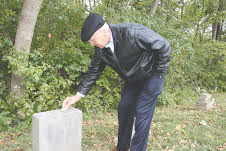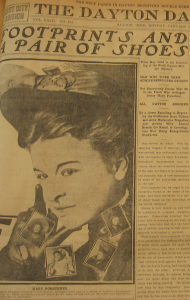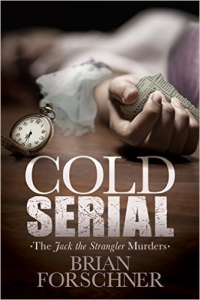
Not long after Jack the Ripper terrorized Whitechapel, another serial murderer stalked Ohio. The press dubbed this new killer “Jack the Strangler.”
When a University of Dayton criminal justice instructor discovered his great-aunt was one of the strangler’s victims, his curiosity drove him to the archives. Blowing the dust off old newspaper reports revealed a few surprises. Not only did this case receive international media attention, his family also became intricately involved in the investigation because his great-grandmother found a clue in her daughter’s coffin.
Brian Forschner joins us today to tell us how he discovered the case and to introduce his new book, Cold Serial: The Jack the Strangler Murders.
Discovery in the cemetery

I’m not sure what possessed me to take a lunch break that day, maybe it was having taught three intro courses to freshmen in the University of Dayton Criminal Justice Program. I decided to go across the street to the Woodland Cemetery (the Wright Brothers are buried there) and have a sandwich. Knowing I had some relatives buried there, I stopped by the office and rifled through the card catalogue. Under “Forschner” I found grandparents and great grandparents but found an outlier, a 15-year-old Mary Forschner who died on January 23, 1909. I immediately thought “There must be other Forschners in the area. I’ve never heard of her.” Within days I obtained her death certificate and, under “cause of death,” found “strangulation by the hand.” More stunningly, she was my grandfather’s sister. I saw him often when I was growing up! She was never mentioned.
Brian Forschner discovers the “Jack the Strangler” cases
I began searching newspapers around the date she died. I was astounded to find her face filling the front page of newspapers around the country. Not only that, but crime reporters were tying her death to that of several other women, which the New York Times had apparently named the “Jack the Strangler Murders.” Over a period of four years I read hundreds of newspaper articles and editorials in papers around the U.S. with references to some in Europe, searched death certificates, autopsies, and trial records where available. I read the newspapers out at least 9 months after each death to see if the murders were solved. They were all cold cases, police records long destroyed. I had to write a book on this, possibly a series of short stories since these cases had been cold for over 100 years.

Hundreds of crime reporters asking different questions from different standpoints gave me snippets of information about the girls and their cases, enabling me to piece together their personalities. I wanted to tell their stories, as telling their stories would be a way to grant them some justice and show that they were just that, young girls murdered and raped, never allowed to grow up, long forgotten, families forever shamed and socially victimized. My training had been in philosophy and logic at the undergraduate level and human behavior and psychology at the doctoral level. I had been a probation officer and operated a group of halfway houses for the Federal Bureau of Prisons and Ohio Department of Corrections, so I felt reasonably well armed to use one of the primary forensic techniques of the time, what some have referred to as “circumstantial logic.” Without eyewitnesses or confessions (forensics was in its infancy), would a reasonable person, given a preponderance of circumstantial evidence, be prepared to convict? This forensic thinking was buttressed by a perfect storm of the literature and press of the time, which painted a picture of the typical criminal, namely as a ruffian or animal, much like Poe did in “The Murders in the Rue Morgue”(an orangutan did it!). This view was supported by the quintessential cold case of all time, Jack the Ripper, and, a disciple of Poe’s, Conan Doyle. Doyle showed that even an untrained individual like Sherlock Holmes could solve mysteries by using simple logic and determination. After all, solving crimes was “elementary.”
Clue in the coffin

My editor loved the Jack the Strangler stories, but I wasn’t happy. I wanted to know who did it. It wasn’t until reading about the viewing of Mary Forschner in the parlor of my great-grandmother’s home, when in anguish she was helped to the casket and bent over to kiss Mary goodbye, that it came together. Great grandma immediately was shaken from her sobbing when she noticed that something was missing, something precious! She cried out to all present. Detectives in attendance rushed to the casket. They had missed it in their investigation.
“Aha,” I thought to myself! “How could I have missed it? The other four girls were the same MO, murdered and then raped, souvenirs had been taken, the crime was brazen, in full site of potential witnesses, a crime on the anniversary date of another crime, and I could trace all but one of the girls to the same bus stop.” Yet, it would not be until I came across an article written several years later about an arrest and conviction for an unrelated offense that I found the murderer/rapist.
My verdict is for you to judge. Read Cold Serial: The Jack the Strangler Murders. Get to know these girls, their stories, and the shame and disgrace their families endured. Tell me if you agree. A critical clue is in the clasped hand on the cover of the book, Cold Serial: The Jack the Strangler Murders © 2016 by Morgan James Publishers.

You can visit Brian Forschner’s website to learn more.
Have you ever discovered old family secrets like Brian Forschner did?




[…] Jack the Strangler: Guest Post by Author Brian Forschner […]
I’m doing a video series on unsolved serial killer cases and would like to interview brian forschner.do you have contact info
Hi, Ron! Have you tried contacting him via his publisher? The publisher would be motivated to establish contact because the video series would help market Brian’s book. If that doesn’t work, contact me again and I’ll see what I can do.